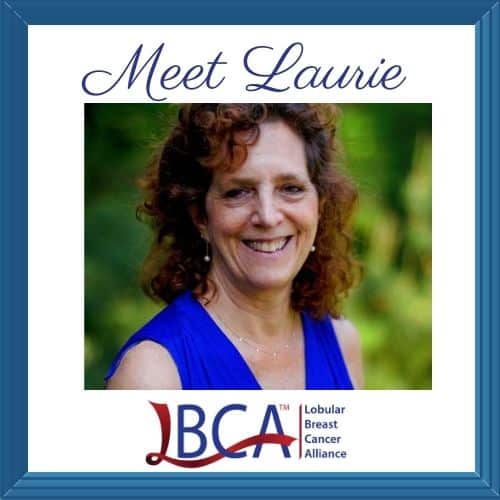Many women with lobular breast cancer who have found their way to the Lobular Breast Cancer Alliance (LBCA) after they were diagnosed want to help build a community among peers, to share the most current information about ILC detection, treatment and clinical trials, and to raise awareness about this common yet understudied and sneaky breast cancer that needs more research. Hear from one of these women who decided first to volunteer, and then signed on to become LBCA’s first executive director.
Meet Laurie
It was just after my 60th birthday, and I was setting out to expand my health policy consulting business full time, when the radiologist viewing my routine mammogram told me – they had found a worrisome spot. I was incredulous. With no family history and feeling no lumps, I thought they had to be wrong. But after a second mammogram, ultrasound, and biopsy in swift succession, I got the crushing call. “You have breast cancer – invasive lobular carcinoma (ILC), and we recommend that you meet with a breast cancer surgeon.”
That moment changed everything – my plans to run my own business and to have elective surgery to replace a badly damaged hip were immediately suspended. I was dumbfounded and distraught. I was given snippets of information. “Your ILC has likely been growing slowly for the last 10-12 years,” they explained, “because lacking a particular protein, ILC often grows in wisps and lines rather than forming a palpable mass.” “This means that it is often hard to detect in routine imaging,” they said. I learned I was one of the 12% of women diagnosed with breast cancer each year in the US that have “lobular” breast cancer (about 44,000 women annually).

I continued working my day job in a daze but was very awake to my stark new reality. I had breast cancer and knew very little about it – like that there is more than one kind of breast cancer – and I had lobular – the sneaky one. Whatever that meant.
Ignoring advice to avoid Dr. Internet, I began a frenzied online search to read and learn whatever I could and to determine what to talk about with my doctors and understand what my pathology report signified for my treatment path and my prognosis. Moments into my online quest and with great relief and gratitude, I found the Lobular Breast Cancer Alliance (LBCA) website. I quickly learned that while a less common breast cancer, it is still a more common cancer in women than kidney, liver, brain or ovarian cancer. I also learned that little research has been done to understand how best to treat it and whether treatment different from that for ductal breast cancer is warranted.
LBCA was a beacon of information and resources to help me find or at least better know where and to whom to inquire for answers to my questions about characteristics, studies, prognoses, and diagnostic tests. I benefited from LBCA’s esteemed group of scientists and clinicians with ILC expertise whose information in studies and presentations populates the website. I was also able to reach out to speak with some of them. Without LBCA I would have felt lost and panicked. Instead, I knew I had found a welcoming community of others with ILC who were supportive and, like me, eager to learn more and raise awareness about ILC and the need for more research.
I also felt good about sharing share what I knew and helping others who were devastated by this dreadful diagnosis. That is why, in the midst of my post-surgery treatment, I dived into volunteering for LBCA. And just about a year ago today, I became its executive director.
I realized that focusing on LBCA’s mission and vision was the work I was meant to carry on. My plans were no longer suspended, they just took a turn. And I have loved every minute of having had the chance to do this every day of this past year, despite the pandemic. I embrace my role to ensure that LBCA, as the only organization in the US dedicated to ILC, will continue:
“to make all who are touched by ILC aware of its unique characteristics and the critical need for more ILC research, to be the go-to source for information on ILC studies, clinical trials and educational tools, to foster partnerships among patients, scientists, clinicians and breast cancer organizations to increase dialogue about ILC and research advocacy, and to fund vital ILC research.”
And I am ever committed to our vision of a world in which lobular breast cancer is found early, treated effectively, and eradicated permanently.
I am so thankful for the LBCA staff, volunteers, and scientific advisors that are helping to make this happen. I look forward to the coming year as we roll out funding for ILC grants and begin to make the transition to an independent organization. I look forward to meeting so many of you on this journey and thank you for all your support.
Would you like to tell others your ILC story? Please email communications@lobularbreastcancer.org to request more information on how to submit your story.

